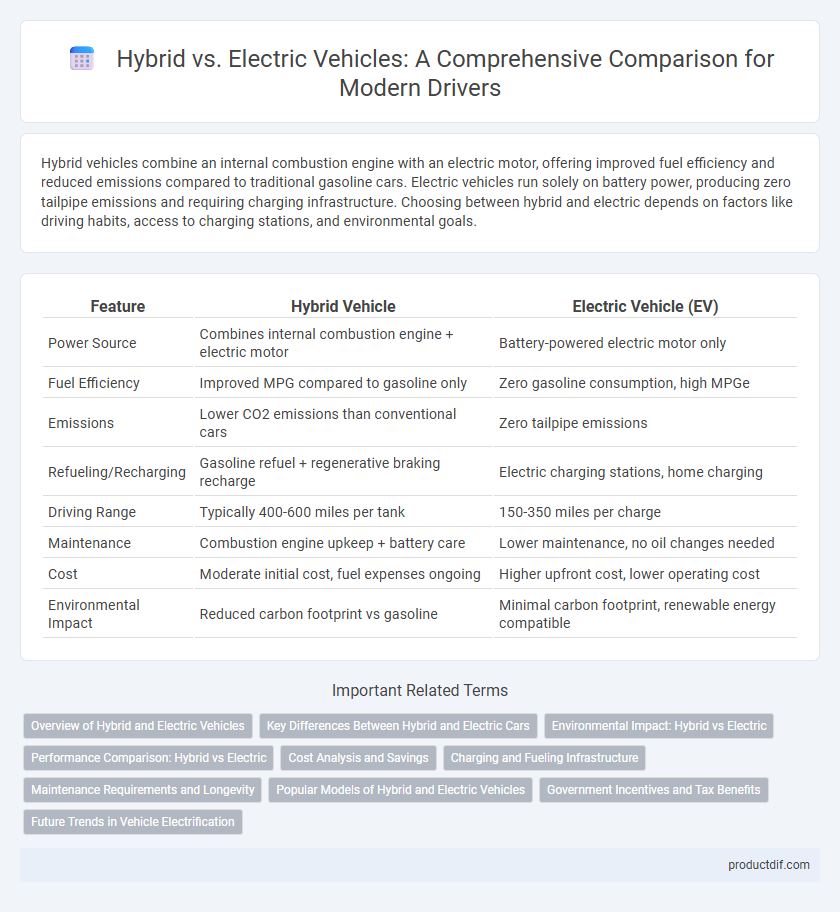Hybrid vehicles combine an internal combustion engine with an electric motor, offering improved fuel efficiency and reduced emissions compared to traditional gasoline cars. Electric vehicles run solely on battery power, producing zero tailpipe emissions and requiring charging infrastructure. Choosing between hybrid and electric depends on factors like driving habits, access to charging stations, and environmental goals.
Table of Comparison
| Feature | Hybrid Vehicle | Electric Vehicle (EV) |
|---|---|---|
| Power Source | Combines internal combustion engine + electric motor | Battery-powered electric motor only |
| Fuel Efficiency | Improved MPG compared to gasoline only | Zero gasoline consumption, high MPGe |
| Emissions | Lower CO2 emissions than conventional cars | Zero tailpipe emissions |
| Refueling/Recharging | Gasoline refuel + regenerative braking recharge | Electric charging stations, home charging |
| Driving Range | Typically 400-600 miles per tank | 150-350 miles per charge |
| Maintenance | Combustion engine upkeep + battery care | Lower maintenance, no oil changes needed |
| Cost | Moderate initial cost, fuel expenses ongoing | Higher upfront cost, lower operating cost |
| Environmental Impact | Reduced carbon footprint vs gasoline | Minimal carbon footprint, renewable energy compatible |
Overview of Hybrid and Electric Vehicles
Hybrid vehicles combine an internal combustion engine with an electric motor to optimize fuel efficiency and reduce emissions, making them suitable for longer trips without the need for frequent charging. Electric vehicles (EVs) rely solely on battery power and electric motors, offering zero tailpipe emissions and lower operating costs but depend on charging infrastructure and battery range. Both technologies contribute to reducing reliance on fossil fuels, with hybrids providing a transitional solution and EVs representing a fully sustainable option.
Key Differences Between Hybrid and Electric Cars
Hybrid cars combine an internal combustion engine with an electric motor, allowing for fuel efficiency and extended driving range, while electric cars rely solely on battery power, producing zero emissions during operation. Hybrids regenerate energy through braking and switch between gas and electric power, whereas electric vehicles require charging from external power sources and offer quieter, smoother rides. The cost of ownership varies significantly, with hybrids generally priced lower but electric cars benefiting from lower maintenance and government incentives.
Environmental Impact: Hybrid vs Electric
Electric vehicles produce zero tailpipe emissions, significantly reducing air pollution and greenhouse gases compared to hybrid vehicles, which rely on both gasoline and electric power. Hybrid vehicles still emit carbon dioxide and other pollutants due to combustion engine use, although they offer better fuel efficiency than conventional cars. Lifetime environmental assessments show that electric vehicles have a lower overall carbon footprint, especially when charged with renewable energy sources.
Performance Comparison: Hybrid vs Electric
Hybrid vehicles combine an internal combustion engine with an electric motor, delivering balanced performance with improved fuel efficiency and extended range compared to traditional cars. Electric vehicles (EVs) provide instant torque and smoother acceleration due to their electric-only drivetrain, resulting in superior zero-to-sixty times and lower maintenance requirements. Performance differences also include hybrids' reliance on fuel and emissions, whereas EVs offer zero tailpipe emissions, enhancing environmental benefits alongside driving dynamics.
Cost Analysis and Savings
Hybrid vehicles typically have lower upfront costs compared to electric vehicles due to less expensive battery technology, while electric vehicles benefit from lower operating and maintenance expenses over time. Fuel savings in hybrids come from improved gasoline efficiency, whereas electric vehicles eliminate fuel costs entirely by relying on electricity, often resulting in significant lifetime savings. Tax incentives and reduced environmental fees further enhance the overall cost-effectiveness of electric vehicles compared to traditional hybrids.
Charging and Fueling Infrastructure
Hybrid vehicles benefit from widespread fuel stations and require less frequent charging due to their combined internal combustion engine and electric motor systems. Electric vehicles rely exclusively on charging infrastructure, which is rapidly expanding but still varies significantly by region. Access to fast-charging stations is critical for electric vehicle adoption, while hybrids maintain the flexibility of traditional refueling networks.
Maintenance Requirements and Longevity
Hybrid vehicles require less frequent battery replacement compared to fully electric cars, as their smaller batteries undergo less strain. Electric vehicles benefit from fewer moving parts in their powertrains, leading to reduced maintenance needs like oil changes or transmission services. Longevity in electric vehicles depends largely on battery health, with advanced thermal management systems extending lifespan beyond 10 years in modern models.
Popular Models of Hybrid and Electric Vehicles
The Toyota Prius remains a popular hybrid vehicle, renowned for its fuel efficiency and reliability, while the Honda Accord Hybrid offers a blend of performance and comfort. In the electric vehicle segment, Tesla Model 3 leads with impressive range and advanced technology, complemented by the Nissan Leaf's affordability and urban-friendly design. Both hybrid and electric models continue to evolve, catering to diverse consumer preferences for sustainability and innovation.
Government Incentives and Tax Benefits
Government incentives for hybrid vehicles often include tax credits, rebates, and reduced registration fees aimed at encouraging lower emissions, with many programs offering up to $4,000 in savings. Electric vehicles (EVs) typically receive more substantial tax benefits, including federal tax credits up to $7,500, state-specific rebates, and exemptions from emissions testing and tolls. These incentives significantly reduce the overall cost of ownership for electric vehicles, promoting widespread adoption and environmental benefits.
Future Trends in Vehicle Electrification
Future trends in vehicle electrification emphasize the growing integration of hybrid electric vehicles (HEVs) and battery electric vehicles (BEVs) driven by advancements in battery technology, such as solid-state batteries offering higher energy density and faster charging times. Regulatory policies targeting carbon emissions compel automakers to accelerate the shift toward zero-emission electric vehicles, while smart grid compatibility and vehicle-to-grid (V2G) technologies enhance energy efficiency and grid stability. Market forecasts predict a significant increase in BEV adoption by 2030, supported by expanding charging infrastructure and decreasing battery costs, positioning electric vehicles as the cornerstone of sustainable transportation.
Hybrid vs Electric Infographic

 productdif.com
productdif.com